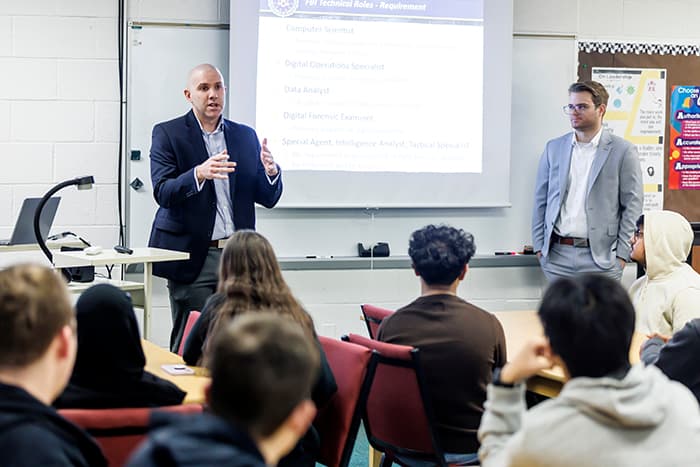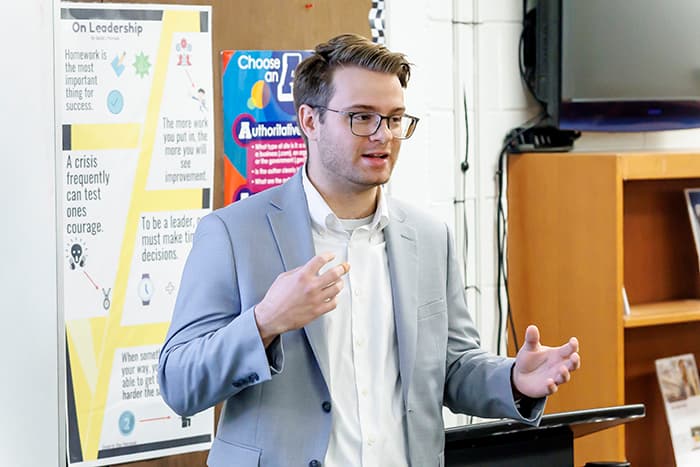Early College Program Prepares Students to Pursue Cyber Careers
February 5th, 2025

HCPSS high school students have access to a wide range of post-secondary opportunities designed to ensure they graduate with the knowledge and skills necessary to make informed career decisions. Such opportunities expose students to different careers and assist them in developing a post-high school plan that is built on self-awareness and aligned with industry trends.
HCPSS’ Early College Program in Cybersecurity (ECPC) is one such resource.
Open to all students in grades 10-12, the ECPC is part of JumpStart, HCPSS’ dual enrollment program offered in partnership with Howard Community College (HCC). The cybersecurity program allows students to earn a high school diploma, a CompTIA Network+ certification, and at least 30 credits towards an Associate of Arts (A.A.) degree in Cybersecurity from HCC.
“The goal of the cyber program is really two-fold,” explains Kristen McManus, who serves as an HCPSS’ Cybersecurity cohort teacher. “We aim to equip students with a strong technical foundation they can build upon after high school. Additionally, we offer opportunities for them to connect with professionals in the cyber field who can provide a clear understanding of the work involved.”
“We want students to come out [of the ECPC program] with a grasp on the basics of cybersecurity, as well as a clear sense of whether a career in cybersecurity is for them or not,” adds nDepth Security’s Director of Engineering, Bill MacCormack, who sits on the program’s Advisory Board and has been involved in the program since its inception a decade ago.
On the technical side, students in the cybersecurity program take a variety of college-level computer science/cybersecurity classes, and participate in technical skills seminars.
To gain additional insights into the cyber field, ECPC students regularly meet with members of the program’s Advisory Board. Composed of business owners, chief technology and information officers, and other leaders in the cybersecurity field, the Advisory Board performs a variety of roles. Its members conduct mock job interviews with students; assist them with resume-building; provide ongoing mentorship; share information about current industry trends; and provide feedback on students’ capstone projects in their senior year. At the same time, Advisory Board members share their experiences working in cybersecurity, helping raise students’ awareness of the range of opportunities available in that field.
Jaylan Garrick is one of 25 Advisory Board members. A graduate of the first ECPC cohort, Garrick now works as a Database Architect at Plex Solutions.
“It’s so rewarding to see the kids smile and the ‘wheels turning’ when they ask questions about how I got to where I am today. I really just enjoy seeing them mature and helping them find paths that align for what they want to do in the future,” he says.
MacCormack agrees.
“I love seeing students progress through the cyber program,” he says, adding that he wishes he had access to such a program when he was in high school.
“I didn’t know what I wanted to do at that point in my life. It would have been so helpful to have a program like this one to help me figure that out,” MacCormack says.

In addition to meeting with Advisory Board members, students have the opportunity to engage with a variety of guest speakers. These speakers have included representatives from Fort Meade Alliance, the National Security Agency and Northrop Grumman, among others.
Most recently, students met with two members of the Baltimore division of the Federal Bureau of Investigation (FBI), who shared their paths to becoming FBI agents, what their work entails, and where opportunities lie for those interested in working in cybersecurity at the FBI.
“By sharing their first-hand, real-world work experience, the speakers broaden students’ understanding of the cyber field and help them determine whether the field is one they are genuinely interested in pursuing,” McManus says.
Complementing these experiences, ECPC students participate in goal-setting lessons taught by HCPSS Applications and Research Lab (ARL) and HCC counselors.
Students enrolled in ECPC say the program benefits them in a variety of ways, including helping them establish meaningful professional connections, preparing them for college and helping them to better understand the cybersecurity field.
“Being set for success and the connections I made were some things I enjoyed the most about the Early College Program,” notes Ibukun, who graduated from Atholton High School and is now a college sophomore. “The tools and resources were readily available, with good instructors and counselors who could guide or connect you with someone that could guide you. No question was left unanswered.”
Jaden, a senior at Marriotts Ridge High School, says the program has “given him a headstart on pinpointing his educational and career aspirations in the future.”
“I enjoy taking college classes and having a real college experience while still in high school,” adds Glenelg High School junior Julia.
At the same time, students say ECPC affords them a unique opportunity to meet and collaborate with students across Howard County who share their interests.
ECPC alum and current UMBC student Skye Song says the program also pays financial dividends.
“By enabling me to earn my A.A. degree while I was still in high school, the program basically allowed me to jump ahead in my college career and have part of my college education paid for,” he says. “With the cost of college tuition being so high these days, that is a huge benefit.”
“There is so much that students can gain from the Early College Program in Cybersecurity,” McManus says. “From the professional connections they make and the technical skills they learn, to the confidence they develop by taking college-level courses, students come away with knowledge and experiences that will help them whether pursue a career in cybersecurity or choose another path.”
 HCPSS
HCPSS

